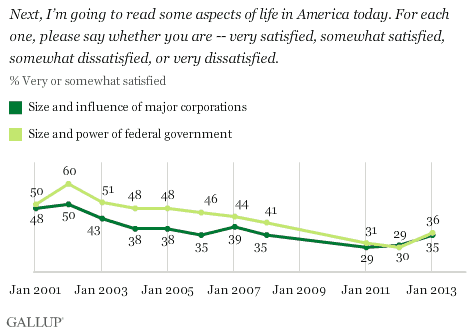Democrats Most Dissatisfied With Corporations, Republicans Just Dislike the Federal Government –
By Glynn Wilson –
Americans dislike large corporations as much as some are dissatisfied with “big” government, and a large majority of Americans want corporations to have less influence on American life, according to the latest Gallup Poll’s “Mood of the Nation” survey.
A large majority, 65 percent, say they are very or somewhat dissatisfied with the size and influence of major corporations, while only 36 percent say they are very or somewhat satisfied with the size and power of the federal government.
Satisfaction with corporations and government are up slightly from the past two years, but significantly below satisfaction levels recorded in the early years of the last decade, when satisfaction with government was generally higher than satisfaction with major corporations, according to Gallup.
Satisfaction with major corporations and the federal government reached their highest points in January 2002, a period when many Gallup measures were at high level in the aftermath of the 9/11 terrorist attacks. But even before 9/11, in January 2001, about half of Americans said they were satisfied with the influence of major corporations and the federal government. Levels of satisfaction drifted down after 2002, and were at their lowest points in 2011 and 2012, before recovering slightly this year.
Prior to last year, Americans were generally more satisfied with the federal government than with major corporations, but in 2012 and 2013, satisfaction ratings of both have been essentially tied.
Public attitudes toward the size, influence and power of major corporations and the federal government are directly related to an individual’s politics, according to Gallup.
Democrats are more satisfied with the federal government and less with major corporations, while Republicans continue to express their dislike of the U.S. government in general. It’s as if they don’t want government to work.
But even among Republicans, who traditionally have been the most supportive of big business, less than half say they are satisfied with the size and influence of major corporations.
Gallup asked those who said they were dissatisfied with the size and influence of major corporations if they wanted major corporations to have more influence, less influence or to keep their influence as it is now. Most of those who say they are dissatisfied want corporations to have less influence.
Implications
“More than 60 percent of Americans are dissatisfied with the size and power or influence of major corporations and the federal government, highlighting the broadly negative reaction people have to ‘big’ things in American society,” Gallup concludes. “These reactions attest to the public relations challenges these entities face as they go about their business.”
Yet, other Gallup data show that Americans are much more positive about certain aspects of the government and corporations. In this same survey, for example, 74 percent said they were satisfied with “the nation’s military strength and preparedness” and 67 percent were satisfied with the nation’s “security from terrorism.”
“Both of these, of course, are largely a reflection of the federal government’s work,” Gallup says, revealing a contradiction in peoples’ thinking on the subject.
Previous research has shown that government agencies such as the Centers for Disease Control and Prevention, the National Aeronautics and Space Administration and the Federal Bureau of Investigation retain mostly positive images.
“What’s more, Gallup’s annual update on the image of business and industry sectors shows that 73 percent of Americans have a positive image of the computer industry,” Gallup concludes. This includes many small businesses but the industry is dominated by major corporations such as Apple, Google and Facebook.
“The challenge for major corporations and the federal government then, it would seem, would be to highlight the positive contributions they make in various ways and to attempt to better understand why the public is suspicious in general of their influence and power,” Gallup says. “It may be a fundamental part of Americans’ views to be suspicious of the size and power of big entities, but clearly, this is not a universal sentiment about all components of either the government or major corporations.”
Analysis
Sometimes Gallup’s analysts try too hard to be objective in the economic sense, rather than the scientific sense. Either that or they just aren’t that bright.
Democrats want the government to work and tend to like it when there are competent people in charge hiring on the basis of merit and at least trying to make it work. Republicans appear to dislike government so much they don’t seem to want it to work at all. What Democrats don’t like about the government right now is that the Republicans in the House are constantly acting as obstructionists to progress. What Republicans don’t like is that a black Democrat is president, rather than a do-nothing, laissez-faire dufus.
As for corporations, it is obvious why people are unsatisfied with so much control by multi-national corporations on their daily lives, from the pollution in the air and water to the food people eat. Since the conservative-slanted U.S. Supreme Court handed corporations even more power and influence over our public affairs with the Citizens United vs. FEC decision, even a lot of Republicans are beginning to recognize that large power companies, oil and gas companies, chemical companies, pharmaceutical companies and the like are too big and have too much power and influence over government and our daily lives.
That’s why people are dissatisfied.
Survey Methods
Results for this Gallup poll are based on telephone interviews conducted Jan. 7-10, 2013, with a random sample of 1,011 adults, aged 18 and older, living in all 50 U.S. states and the District of Columbia. For results based on the total sample of national adults, one can say with 95% confidence that the maximum margin of sampling error is plus or minus 4 percentage points.














